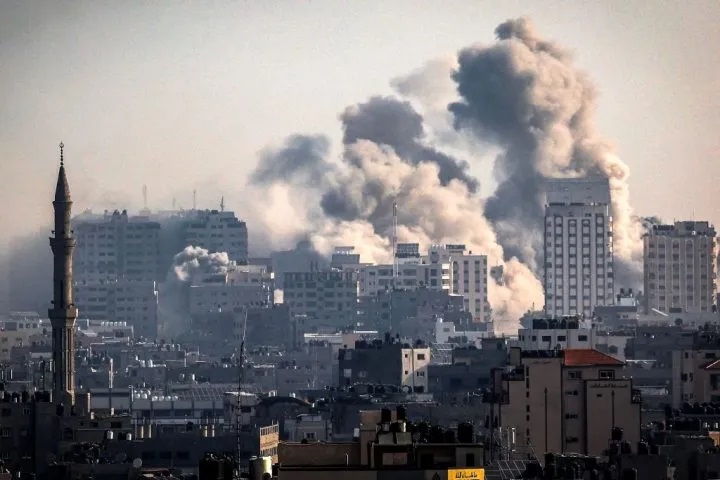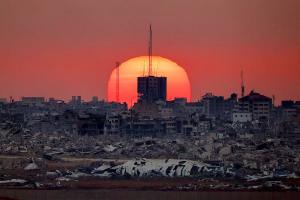Israel has no other choice but to carry on bombing Gaza if it wants to destroy Hamas. Its campaign of relentless air strikes and long range artillery barrages has so far been effective at eroding Hamas’ military capability and limiting the Islamist group’s capacity to kill more Israelis.
Hamas has been unable to respond in any meaningful way since Israel’s offensive began. It has been limited to hit and run attacks, inflicting only relatively light casualties. Israel’s unrelenting bombardments, combined with the internet and cellphone outages, will have caused chaos within Hamas’ command structure.
Palestinians are dying because Hamas attacked Israel and killed without mercy
But the bombing campaign has come at a huge and terrible cost. Along with the catastrophic damage to residential neighborhoods in Gaza, the latest figures suggest that up 10,000 Palestinian civilians have been killed, of which 4,000 are children. Earlier this week, UN Secretary General Antonio Guterres said Gaza had become a “graveyard for children.”
Thousands more innocent people have been wounded and are waiting for treatment in conditions which doubtless defy imagination, proving once again that war is hell. But what would be the alternative?
Israeli Prime Minister Benjamin Netanyahu has repeatedly ruled out a ceasefire. The other option would be for the Israeli Defense Forces (IDF) to suspend airstrikes and instead send in its ground troops without the protection of air cover in the knowledge that Israeli soldiers would be sacrificing their lives in an effort to save those of the Palestinians. But in the wake of the heinous October 7 attacks which left more than 1,400 Israelis dead, and saw over 240 taken hostage, asking Israeli soldiers to die so that Palestinians can live is a trade-off that Israel will never make.
Another possible alternative would be to halt or abandon the ground campaign and air strikes and instead only conduct precise surgical strikes against positively identified Hamas leaders. They would do so only when there was zero risk of so-called collateral damage — killing civilians — in one of the most densely populated areas of the Middle East.
But such a strategy, even if it worked, could take months, possibly years. In the meantime, Hamas would rearm, rebuild and recruit, all the time celebrating its “victory” over Israel.
Aaron David Miller, a senior fellow at the Carnegie Endowment for International Peace, and an advisor on Arab-Israeli negotiations to both Republican and Democrat secretaries of states, spelt out the enormity of the problem. He told the BBC:
How do you pursue, in the wake of the brutality and savagery of Hamas’ terror surge on October 7, a military campaign to eradicate Hamas as a military organization in a densely populated urban area where Hamas assets are embedded, without killing civilians? How do you pursue both of those objectives without causing an exponential increase in the taking of innocent Palestinian lives? I’ve talked to so many military experts and nobody has come up with an answer.
The brutal reality of this current episode in the war with Hamas is that Palestinians are dying because Hamas attacked Israel and killed without mercy. They chose the softest of targets — the elderly, the disabled, babies, young people attending a peace concert — and then celebrated their depraved acts online.
Hamas would have expected such a response from Israel. The group’s leaders have repeatedly stated that Palestinians are prepared to be martyrs in the war against Israel and despite civilian losses, the group may even be preparing for a counterstrike.
Adeeb Ziadeh, a Palestinian expert in international affairs at Qatar University who has studied Hamas, said the group must have had a longer-term plan to follow its assault on Israel.
“Those who carried out the October 7 attack with its level of proficiency, this level of expertise, precision and intensity, would have prepared for a long-term battle. It’s not possible for Hamas to engage in such an attack without being fully prepared and mobilized for the outcome,” Ziadeh told Reuters.
Washington now expects Hamas to try to bog Israeli forces down in urban combat in Gaza and inflict heavy enough military casualties to weaken Israeli public support for a drawn-out conflict. But the IDF is making progress. It has now completely encircled Gaza City and divided the besieged coastal strip in two. In the coming days, Israeli ground forces will begin the next stage of the ground operation and start clearing the captured area house by house and street by street.
Much will depend on what Hamas decides to do. If the terrorists remain in the area hoping to trap the IDF in a series of bloody sacrificial street battles then the fighting is likely to be intense. Some reports suggest that up to 300,000 civilians have remained, either under duress or by their own accord, and so the death toll will, tragically, rise again.
But what remains clear is that the IDF will not alter its “bomb, clear, hold, contain” strategy. That is despite the enormous civilian cost which comes with it, and the accompanying international criticism of their offensive.
This article was originally published on The Spectator’s UK website.


























Leave a Reply